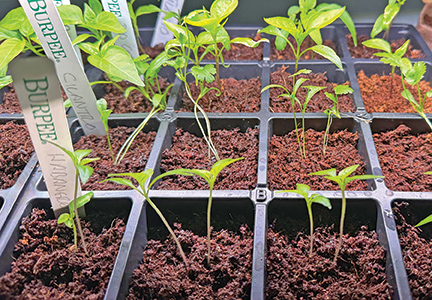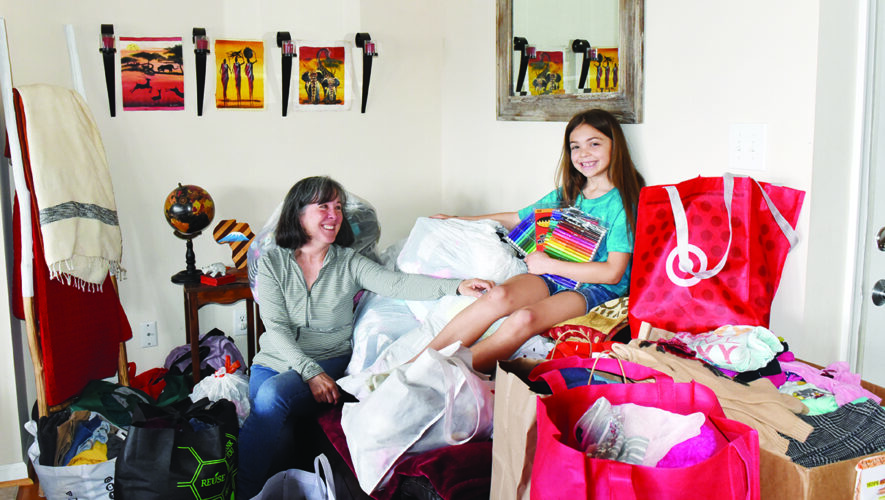Rutgers Cooperative Extension education series covers planning, planting, harvesting, cold prep
CAPE MAY COURT HOUSE — Although winter is just starting to kick in, gardeners may be thinking ahead to spring.
For those looking to get a head-start, Rutgers Cooperative Extension is offering a five-class series that takes students from learning about soil basics and planning a garden to planting, harvesting and extending the season.
Taught by Jen Sawyer Caraballo, the Rutgers Master Gardener volunteer coordinator for Cape May County, the Start Your Garden Vegetable Gardening series begins Feb. 28 and takes place monthly through June.
Three of the classes are to be held in-person at the campus in Cape May Court House and the other two are via Zoom. Students can take the entire series or pick and choose among the topics.
The first class from 6:30 to 8:30 Feb. 28 is in person and covers gardening planning and soil basics. The next, 6:30 to 8:30 p.m. March 27, is on starting and planting seeds. The April 17 class from 6:30 to 8 p.m. is online and covers plant care. From 6:30 to 7:30 p.m. May 22, the Zoom class is about harvesting, use and storage. The final class, back in person, is 6:30 to 8 p.m. June 12 on extending the season.
The series costs $45 (slightly more if classes purchased individually).
“I would prefer people to sign up for the whole series,” Sawyer Caraballo said. “That way they’re getting a start-to-finish training, but we’ve made it so they can sign up for each individual part.”
Sawyer Caraballo said a mix of people attend her classes.
“We get some absolute beginners and some novices to people who have been planting gardens their whole lives. The ages range from 20 to 70-plus,” she said.
As an example of the advantage of the series for those who are experienced is in seed-starting. Gardeners can get seeds to sprout, but the plants “get too leggy and they don’t know why or they’ll suddenly die off. They’re not sure what happened. I go a little more in depth in seedling care, what to watch out for, especially adjusting grow lights, watering from the bottom versus drowning everything from the top.
“I have found a lot of people say they’ve been gardening for years but they’ll just throw some seeds out there or their seed-starting isn’t always so successful,” she said.
Sawyer Caraballo noted some gardeners may place their seedlings by a window for the sunshine but don’t realize how cold that spot could become after dark. “It may be toasty and warm all day long, but at night the cold air seeps through.”
Here is more about the classes:
Feb. 28: Garden Planning and Soil Basics 6:30-8:30 p.m. in person
Students will learn about soil health and how to test their soil. The $25 cost (for this class alone) includes a soil test kit. Students will learn about garden planning, selecting a site and preparing that area for planting.
“I’ll talk about the different components of the soil,” Sawyer Caraballo said. “Everyone will have a soil test kit to take home. I’ll go over what a soil test kit will tell you about your pH and your micro and macro nutrients. It also gives you any amendments you will need to correct those things.
“I want people to start out understanding what healthy soil is,” she said. “It’s not just ‘that soil looks good.’ We need to know what’s in it. If you’re digging in your yard and you’re not finding any kinds of worms or insects or fungi … then I suspect something is not going right with your soil. Your soil should be teeming with microorganisms and worms and all that good stuff.”
March 27: Seed Starting and Planting 101 6:30-8:30 p.m. in person
Students will learn how to select seeds and supplies and start the seeds as well as how to care for the seedlings and when and how to plant, including comparison planting. The $15 cost (for this class alone) includes a seed starter to take home.
“I go over the real basics of starting your own plants from seeds, starting them indoors versus what is better for direct sowing in your garden,” she said. “I’ll also do a little bit on succession planting since we’re focusing on vegetables. If you want to have those lettuces grow longer, we’re going to plant so many, wait two weeks, plant some more, so as you’re harvesting you’re kind of replacing and harvesting at the same time. I’ll also do a little bit on companion planting — which plants grow better next to each other. There are some facts and some things a little ‘wives tale’ about it.”
She explained the factual side is about which plants grow well near each other and not tales of how planting things together can prevent aphids or protect those other plants.
April 17: Plant Care (6:30-8 p.m. via Zoom)
Students will learn about watering, fertilizing for the different stages — vegetative grown through flowering through fruiting — and general plant care, as well as about pests and diseases that can impact their gardens. Cost is $5 for this class alone.
“Different plants have different needs as they go through stages,” Sawyer Caraballo said. “We want to set people up for success so they have a successful harvest.”
The class will include staking for taller plants.
May 22: Harvesting, Use and Storage 6:30-7 p.m. via Zoom
Sawyer Caraballo is teaching the May 22 class with Belinda Chester, a program associate from the Atlantic County Rutgers Cooperative Extension. Students will learn when to harvest common garden vegetables and how to use and store them. Cost is $5 for this class alone.
“I will talk about when to harvest and Belinda and I will tag-team on ways to use your vegetables,” she said. “She’ll go over storage methods like canning, drying, freezing — just basics.”
June 12: Extending The Season 6:30-8 p.m. in person
The final class in the series will cover planting cold-hardy crops that can be harvested late into the fall and those that will overwinter for a spring harvest. Students also will learn about row covers and hoop houses. Cost is $5 for this class alone.
It also will cover getting a jump-start on spring planting and harvesting, Sawyer Caraballo said.
“Since we’re still in June, they can start another batch of seeds in August to plant in September to maybe have lettuces, things like kale and cabbages and turnips and beets. Those are things you can grow into the fall. They don’t mind the fall so much.
“That presentation is very photogenic. I have a lot of DIY — how you can do these things on the cheap. It doesn’t have to be this big, huge expense. And then we’ll talk about getting that jump on spring planting.”
Take all five sessions for $45 (a $10 discount). Register at go.rutgers.edu/upk74hb6
Don’t want to take all five? Follow the link above, then click on the “Course ID” of the class you are interested in attending and register for just that class.
For more information, contact Sawyer Caraballo at (609) 465-5115, ext. 3615 or sawyer@njaes.rutgers.edu.
By DAVID NAHAN/Sentinel staff



